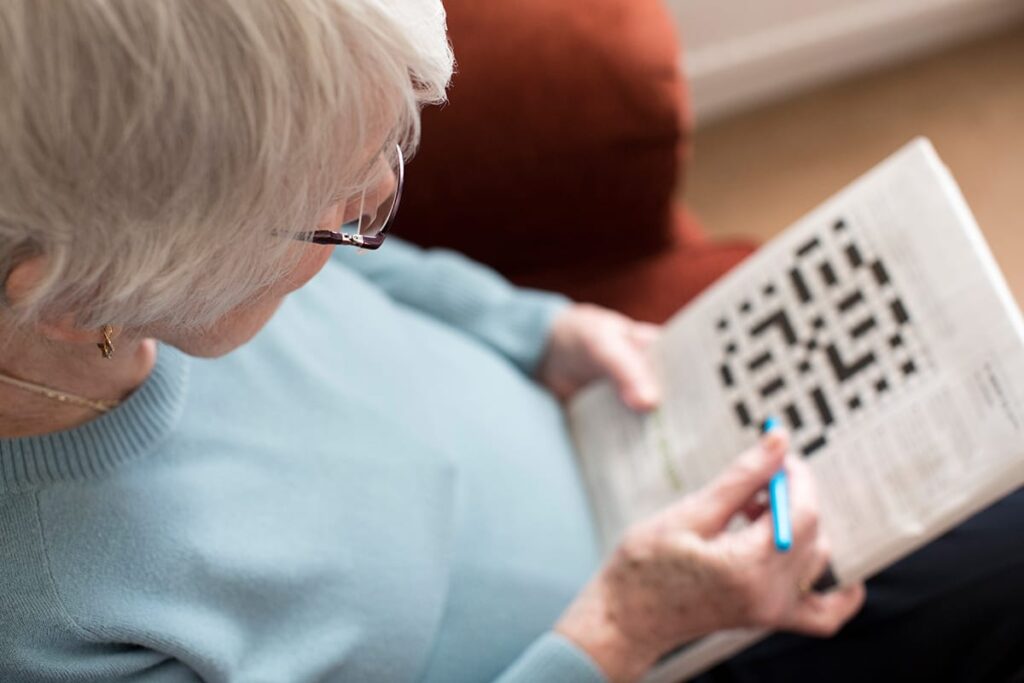As people age, it’s common to experience some degree of memory loss. However, there are many exercises and activities that can help seniors maintain and even improve their cognitive abilities. Adopting these exercises to improve memory in your daily routine can help keep concentration and cognitive issues at bay.
Calder Woods offers a range of senior living options in our community in Beaumont, Texas. From independent living to memory care, you or a loved one can get the care needed to make retirement enjoyable. Call 409.407.7636 to schedule a consultation.
Why Memory Declines
Memory decline is a normal part of aging. As people get older, changes occur in all parts of their bodies, including their brains. Some neurons naturally die off, while others lose their connections to other neurons, leading to slower processing speeds and difficulty recalling information. Stress and lack of sleep can also contribute to memory problems.
10 Brain Exercises to Improve Memory
Here are ten brain exercises that can help seniors strengthen their memory:
- Crossword puzzles – Solving crossword puzzles challenges the brain and keeps it active, which can help maintain and improve cognitive function.
- Memory games – Games like matching cards or remembering sequences can help exercise short-term memory and attention skills.
- Reading and discussion – Reading stimulates the brain, and discussing what you’ve read can help reinforce memory pathways.
- Learning a new skill – Whether it’s knitting, painting, or playing a musical instrument, learning something new creates new neural pathways in the brain.
- Meditation – Regular meditation can improve focus and clarity, reducing forgetfulness.
- Brain-training apps – There are many apps available that provide games and exercises designed to improve memory and other cognitive skills.
- Language learning – Learning a new language exercises all aspects of your cognitive skills, including memory.
- Puzzles – Jigsaw puzzles, Sudoku, and Rubik’s cubes stimulate the brain and can help improve spatial reasoning and memory.
- Writing – Whether it’s journaling or writing letters, writing helps consolidate memories and keep the mind sharp.
- Music – Playing an instrument or listening and trying to remember lyrics can enhance memory and cognitive skills.
There are some additional activities you can also make regular parts of your routine to help improve your memory.
Physical Activities to Improve Memory and Concentration
Physical activity is not just good for the body—it’s also beneficial for the brain. Regular physical exercise increases blood flow to the brain, which can help enhance cognitive function and memory. Activities like walking, yoga, swimming, and tai chi can all be beneficial. Besides, engaging in group sports or classes can provide social interaction, which has also been shown to improve cognitive health.
Signs Memory Care May Be Needed
While it’s normal to have occasional memory lapses, consistent or worsening memory problems may indicate a need for professional memory care. Signs to look out for include:
- Difficulty remembering recent events, conversations, and appointments.
- Getting lost or confused in familiar places.
- Disorientation with time and place.
- Difficulty managing finances and making decisions.
- Increased agitation or confusion.
If you’re concerned about your memory, it is important to visit a doctor for an assessment as soon as possible. Memory care in a dedicated senior living community is the most effective way to ensure that your loved one gets the specialized care they need.
Help Your Loved One with Memory Care at Calder Woods
At Calder Woods, our memory care services are designed to help residents stay active and independent. We offer activities and programs specifically tailored for those with cognitive impairments. Our caring staff works with each resident on an individual basis to create a personalized plan of care tailored to their needs.
We understand how difficult it can be to watch your loved one struggle with cognitive decline and memory problems. Find them the help they need by calling 409.407.7636 or completing our online form.

